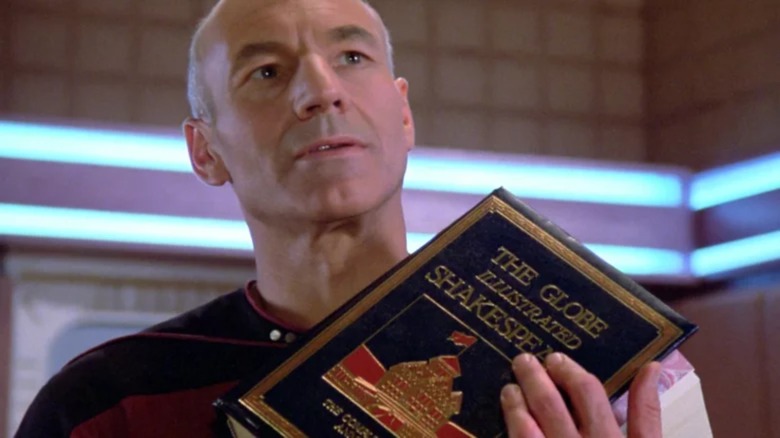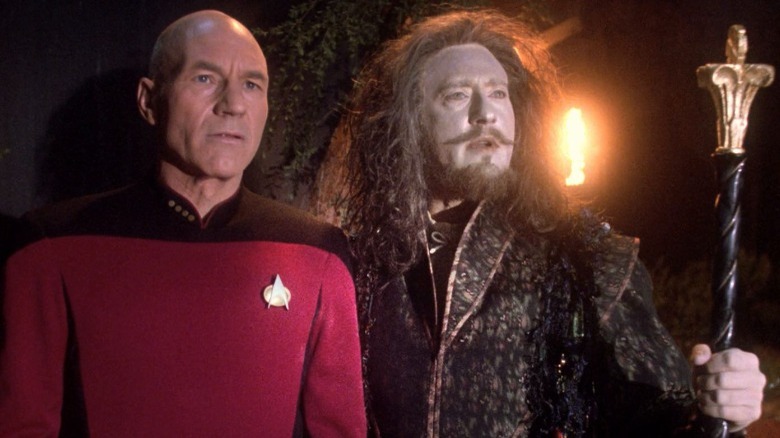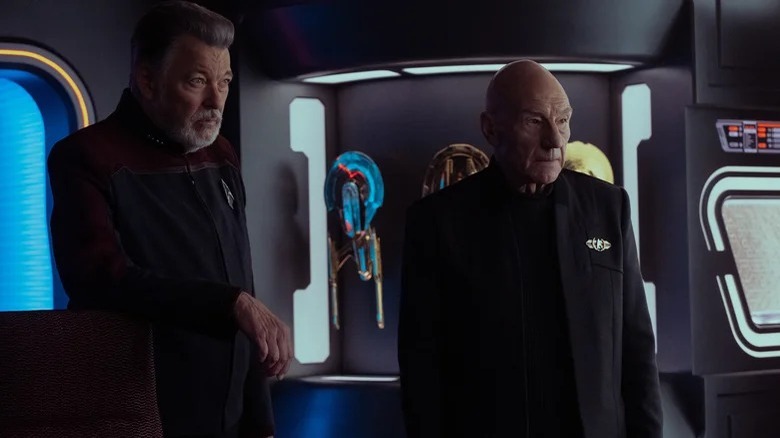Of Course The Picard Series Finale Features Some Shakespeare
This post contains spoilers for the series finale of "Star Trek: Picard."
Throughout the final season of "Star Trek: Picard," Jean-Luc Picard (Patrick Stewart) is a man of surprisingly few words. Sure, the beloved retired captain chimes in with theories during the show's many exposition-heavy scenes, and has a few heart-to-hearts with his son Jack (Ed Speleers) and old pal Riker (Jonathan Frakes), but he's decidedly light on leaderly monologues. Picard is even fairly reticent when he's saying what may be one final goodbye to his crewmates, simply saying, "It means so much to me –" to Riker before parting ways.
I'll admit that moment in the finale had me yelling at the screen, hoping Picard would get the chance to say something, anything, that felt like a signature "Star Trek" sign-off before bowing out. I should've known the show was saving the best for last, and by best, I of course mean a signature Shakespearean interlude.
Shakespeare and Star Trek go way back
Jean-Luc Picard has been a fan of the Bard for pretty much as long as he's existed, thanks in large part to Stewart's own history with Shakespeare and the franchise's pre-existing literary streak. As The L.A. Times tells it, when Stewart was cast in "Star Trek: The Next Generation" in 1987, the outlet referred to him as an "unknown British Shakespearean actor." It was a superlative that stuck, as co-star Brent Spiner apparently had a sign made for Stewart's trailer door emblazoned with that exact phrase.
Soon, though, Stewart became extremely well-known, and his history on stage in Shakespearean productions became intertwined with the character he played in the much-loved series. Picard's first Shakespeare reference comes up in the very first episode of "Star Trek: The Next Generation," when he quotes "Henry VI, Part 2" in his first showdown with Q (John de Lancie). The works of Shakespeare appear again and again throughout the series, with both Picard and Data (Spiner) turning to the Bard's works as the key to understanding the whole of the human condition.
"Star Trek" has been obsessed with Shakespeare's works since long before Picard ever stepped foot aboard the Enterprise-D. Five different episodes of Gene Roddenberry's original series pull their titles from Shakespeare lines, including the fan-favorite time-travel episode "All Our Yesterdays," which references "Macbeth." Over the decades, the franchise's Shakespeare references have ranged from the silly (in one episode of "The Next Generation," the crew convinces a 19th-century Earth landlady they're traveling actors working on a production of "A Midsummer Night's Dream") to the insightful (in another, Picard uses Data's performance as Prospero to comment on art, hope, and despair). As "Picard" comes to an end, it lands its dismount with an especially heartfelt recitation.
'We must take the current when it serves'
"There is a tide in the affairs of men/Which, taken at the flood/Leads on, to fortune. Omitted, all the voyage of their life is bound in shallows and in miseries/On such a full sea are we now afloat/And we must take the current when it serves/Or lose our ventures." – Brutus, "Julius Caesar"
In the final episode of "Star Trek: Picard," when the dust has settled and the Borg have been held at bay, Data passes over the honors of one last toast to his captain. In typical retiree-with-exactly-one-hobby fashion, Picard goes back to the works he knows best. With no ado but plenty of heart, he recites the above passage from "Julius Caesar" while his stalwart crew looks on, savoring the moment. When he's done, Picard gives a shrug while the crew drinks to his words.
"Star Trek: Picard" doesn't unpack its final Shakespearean reference, but the loving looks on the faces of Stewart and the castmates who have called this show home for over 30 years say it all. In the quote, Brutus is speaking about identifying the opportune moment to make his next move in the power struggle over rulership of Rome. More broadly, though, and in the context of "Star Trek: Picard," the sentiment is one of seizing a moment before it passes like a tide — going with the flow and taking everything life gives you while it still has more to give. In short: Cherish these moments, as they might make up the best days of our lives. Hey, maybe that Shakespeare guy was onto something.


